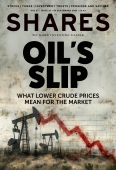Archived article
Please note that tax, investment, pension and ISA rules can change and the information and any views contained in this article may now be inaccurate.
Bank shares under pressure after think tank proposes ‘windfall’ levy

Shares in UK banks dropped last on 29 August after the publication of a report by the IPPR (Institute for Public Policy Research) recommending the government introduce a new tax on ‘excess’ profits generated since the pandemic.
Shares in Barclays (BARC) fell 2.2% to 360.4p while Lloyds (LLOY) fell 3.4% to 79.5p and NatWest (NWG) fell 4.9% to 510.6p at the close.
The IPPR report centres on the fact the Bank of England is making significant losses, due to the unintended consequences of QE (quantitative easing), by selling government bonds below their purchase price and on interest rate losses, with an estimated cost to the Treasury of £22 billion per year during the current parliament.
The think tank suggests a two-pronged approach to tackling the issue: introducing a ‘QE reserves income levy’ on all domestic and foreign commercial lenders in the UK with assets of more than £25 billion, to raise between £7 billion and £8 billion per year; and slowing the pace of undoing QE by ending the ‘fire sale’ of government bonds, saving more than £12 billion per year.
By taxing reserve returns in excess of 2%, which it describes as ‘windfall profits’ for the banks, the IPPR estimates the Treasury would save between £35 billion and £40 billion of taxpayer losses over the course of this parliament, boosting fiscal headroom against the current budget by £5 billion to £7 billion, with the proceeds used for ‘supporting households and growth’.
‘The UK taxpayer is spending £22 billion a year compensating the Bank of England for losses on its QE programme, public money which is partly being funnelled to commercial bank shareholders,’ says the think tank.
‘This subsidy of commercial banks, at the expense of public services, is boosting bank profits while millions face the cost-of-living crisis. Since interest rates began rising in December 2021, the four largest UK banks have seen their annual profits more than double, up by £22 billion compared to pre-pandemic. Some of this is a direct transfer of funds from the taxpayer to shareholders.’
The IPPR argues the proposed levy does not interfere with the Bank of England’s operations but would more or less match the interest-rate losses made and would be time-limited, so if interest rates fall below 2% or QE is finally unwound it would be lifted.
Important information:
These articles are provided by Shares magazine which is published by AJ Bell Media, a part of AJ Bell. Shares is not written by AJ Bell.
Shares is provided for your general information and use and is not a personal recommendation to invest. It is not intended to be relied upon by you in making or not making any investment decisions. The investments referred to in these articles will not be suitable for all investors. If in doubt please seek appropriate independent financial advice.
Investors acting on the information in these articles do so at their own risk and AJ Bell Media and its staff do not accept liability for losses suffered by investors as a result of their investment decisions.
 magazine
magazine








